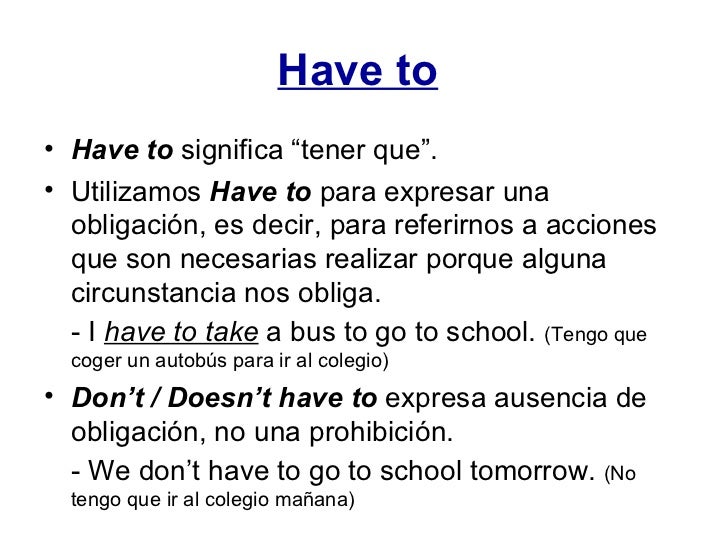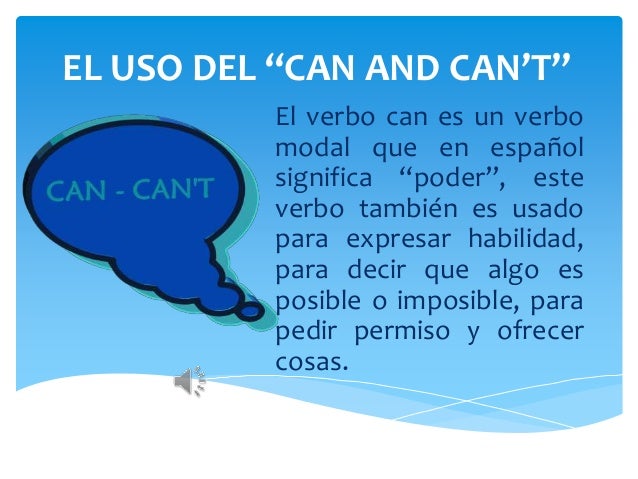martes, 19 de julio de 2016
viernes, 1 de julio de 2016
miércoles, 8 de junio de 2016
miércoles, 25 de mayo de 2016
jueves, 19 de mayo de 2016
martes, 15 de marzo de 2016
UNIT 7 TO HAVE VS HAVE TO
El verbo "to have" significa haber o tener
I have a car- Yo tengo un coche
Presente Simple
Estructura
Sujeto + have/has
| Conjugación | Significado |
|---|---|
| I have | yo tengo |
| you have | tú tienes |
| he has she has it has | él tiene ella tiene ello tiene |
| we have | nosotros tenemos |
| you have | vosotros tenéis |
| they have | ellos tienen |

Verbo "tener - haber" (Pasado)
Como verbo TENER | Como verbo HABER |
|
|
(*) más utilizado en España; (**) más utilizado en América Latina.
|
INTERROGATIVE
Como verbo TENER
|
Como verbo HABER
|
|
|
Contracciones
| Sin contraer | Contraído |
|---|---|
| I have | I've |
| you have | you've |
| he has she has it has | he's she's it's |
| we have | we've |
| you have | you've |
| they have | they've |
Contracciones del Presente Simple (negación)
| Sin contraer | Contraído |
|---|---|
| I have not | I haven't I've not |
| you have not | you've not o you haven't |
| he has not she has not it has not | he hasn't she hasn't it hasn't |
| we have not | we haven't we've not |
| you have not | you haven't you've not |
| they have not | they haven't they've not |
Write in your notebook the answer correct


Have to - obligación en inglés
es un verbo semi-modal que se usa muy frecuentemente en inglés para expresar obligación. Decimos semi-modal porque no sigue las reglas de los verbos modales
¿CÓMO SE FORMA?
Afirmativas
I have to wear, You have to wear, He/she/it has to wear, We have to wear, They have to wear
I have to wear uniform at work (tengo que llevar uniforme en el trabajo)
The doctor says she has to stop smoking (el médico dice que ella tiene que dejar de fumar)
Negativas
I don't have to pay this bill until November (no tengo que pagar esta factura hasta noviembre)
She doesn't have to work on Saturdays (ella no tiene que trabajar los domingos)
Interrogativas*
Do I have to wear...? Do you have to wear...? Does he/she/it have to wear...? Do we have towear...? Do they have to wear...?
Do they have to work everyday? (¿tienen ellos que trabajar todos los días?)
Does she have to take an exam? (¿tiene que examinarse?)
Afirmativas
I have to wear, You have to wear, He/she/it has to wear, We have to wear, They have to wear
I have to wear uniform at work (tengo que llevar uniforme en el trabajo)
The doctor says she has to stop smoking (el médico dice que ella tiene que dejar de fumar)
Negativas
I don't have to wear, you don't have to wear, he/she/it doesn't have to wear, we don't have towear, they don't have to wear
I don't have to pay this bill until November (no tengo que pagar esta factura hasta noviembre)
She doesn't have to work on Saturdays (ella no tiene que trabajar los domingos)
Interrogativas*
Do I have to wear...? Do you have to wear...? Does he/she/it have to wear...? Do we have towear...? Do they have to wear...?
Do they have to work everyday? (¿tienen ellos que trabajar todos los días?)
Does she have to take an exam? (¿tiene que examinarse?)
EJERCICIO
Completa estas frases con la forma correcta de have to. .
1. Doctors ............................................ (treat people).
2. Teachers...........................................(be very patient).
3. A secretary .........................................(be organised).
4. Postmen/women............................................(deliver letters).
5. Sportsmen/women..........................(train very hard).
Escribe estas frases en negativo.
1. He has to work in a bank........................................................................
2. I have to work on Saturdays...................................................................
3. They have to study a lot.........................................................................
Escribe las frases de arriba en forma interrogativa.
1. ...............................................................in a bank?
2. .............................................................. on Saturdays?
3. ...............................................................a lot?
Completa estas frases con la forma correcta de have to. .
1. Doctors ............................................ (treat people).
2. Teachers...........................................(be very patient).
3. A secretary .........................................(be organised).
4. Postmen/women............................................(deliver letters).
5. Sportsmen/women..........................(train very hard).
Escribe estas frases en negativo.
1. He has to work in a bank........................................................................
2. I have to work on Saturdays...................................................................
3. They have to study a lot.........................................................................
Escribe las frases de arriba en forma interrogativa.
1. ...............................................................in a bank?
2. .............................................................. on Saturdays?
3. ...............................................................a lot?
viernes, 11 de marzo de 2016
lunes, 29 de febrero de 2016
UNIT 6 GRAMATICA USOS DEL VERBO CAN-COULD
El verbo modal 'could' se utiliza para expresar habilidad en pasado y para expresar cortesía. Se suele traducir como 'podía', aunque en algunos casos se traduce como 'sabía'.
- El modal ‘could’ es el pasado de ‘can’. Al igual que con todos los modales se utiliza la misma forma para todas las personas, tanto singular como plural
Yo podía nadar cuando tenía cinco años.
I could swim when I was five.
(habilidad)
¿Podrías abrir la ventana?
Could you open the window?
(cortesía)

¿CÓMO SE FORMA?
Los verbos modales son iguales para todas las personas y siempre van seguidos de un infinitivo (sin ‘to’). Además, no necesitan auxiliar para formar la negativa y la interrogativa.
ORACION AFIRMATIVA
I could talk louder.
ORACION NEGATIVA
Yo no podía hablar más alto.
I couldn’t talk louder.
ORACION INTERROGATIVA
¿Podrías hablar más alto?
Could you talk louder?
Suscribirse a:
Comentarios (Atom)






